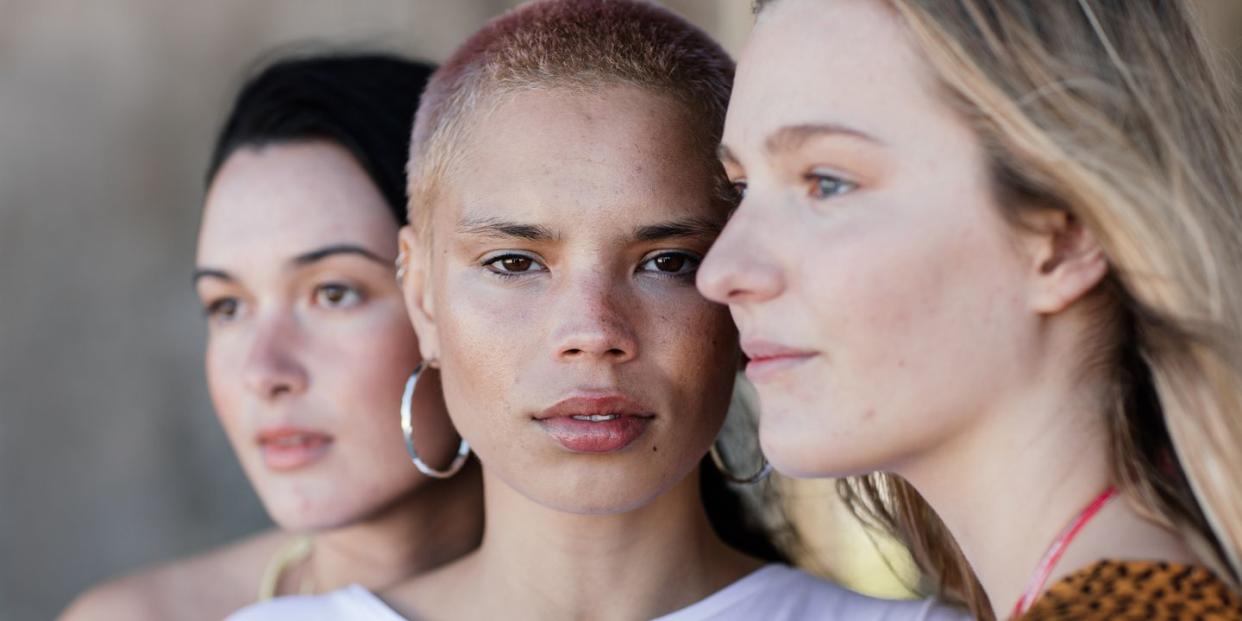Confused about why everyone is talking about celibacy? We got you

The hottest sex trend right now? Abstaining from it. If you haven’t noticed, celibacy is having a moment; from dominating headlines to racking up millions of views on TikTok, what was once considered a fringe practice is suddenly gaining mainstream popularity. But why? If you’re feeling a bit bewildered about where this is all coming from, allow us to explain.
Conversations around celibacy have been gaining traction for the last year or so, but in the past two weeks, they’ve suddenly been everywhere. There are a few reasons for this. The first, and perhaps most important, is the recent Bumble controversy. After announcing that they were pivoting away from their USP of women making the first move – the new update allows women to set a question for their matches to respond to – Bumble ran a series of promotional billboards aiming to poke fun at celibacy. “You know full well a vow of celibacy is not the answer,” read one, while another said: “Thou shall not give up dating and become a nun.”
While sex may be good for you, and, at a time when we’re having less sex than ever, the ads could have struck a chord with those frustrated by lack of intimacy, they received widespread backlash online, with critics saying they dismissed the reasons why some women choose celibacy, including previous trauma or asexuality. “These [are] actually very crazy,” @JunaeBrown captioned an X post, alongside photos of the billboards. “Particularly in a current world where women’s rights to our own bodies and sexual choices are up for political and social debate constantly. Could’ve easily swapped celibacy with ‘single’.”
Even Julia Fox weighed in, commenting on a TikTok carousel showing the ads: “2.5 years of celibacy and never been better tbh.” Bumble has since pulled the ads and issued an apology on TikTok, stating: “Our ads referencing celibacy were an attempt to lean into a community frustrated by modern dating, and instead of bringing joy and humour, we unintentionally did the opposite.” (A few days later, in a cheeky nod to Bumble’s controversy, Feeld added ‘celibacy’ to the list of dating intentions their users can choose from.)
But that’s not the only reason celibacy is trending this week. Comedian Sofie Hagen’s book, Will I Ever Have Sex Again?, comes out on Thursday (May 23), and centres on the 35-year-old’s eight-year abstinence from sex. In the book, Hagen attempts to unpack what has held her back from jumping into bed with someone, despite sometimes wanting to. “I would, in theory, like to have sex. I have a sex drive. I like orgasms. I like being touched,” she writes. But, as she explores later, the psychological barriers of sexism, marginalisation, and her own experiences of sexual violence kept getting in the way. “Girls are sexualised before they become women; trans bodies can often be made to feel like cages; Black bodies are subject to violence; the patriarchy rapes; and we are all taught to hate our bodies for various reasons,” she writes. This cuts to the heart of the problem that many critics have with the Bumble campaign; it put the onus on women to continue to shoulder the issues caused by men and the patriarchy – a blow which perhaps stung more as Bumble’s original intention was to help protect women from creepy or unwanted opening messages from male users.
Of course, Hagen’s book approaches the topic with much more nuance and empathy than many of the TikToks and tweets in response to the Bumble ads, but both cut to the heart of why celibacy has shifted from the domain of the religious into the mainstream dating lexicon: many women are frustrated at the state of the dating scene wherein men are increasingly turning to “alpha” dating gurus like Andrew Tate and adopting regressive political views at a rate that rivals their grandfathers. On top of that, ramping attacks on reproductive rights have left many women feeling like abstinence is their only option.
Enter celibacy-adjacent movements like TikTok’s ‘boy sober’ trend and South Korea’s viral 4B movement. The boy sober movement, started by American comedian Hope Woodard last year, sees women swearing off dating men – which, given that most of those involved are straight, means no dating at all – as a way to deprioritise men in their lives and focus on other areas, such as friendships or their career. “I was just on standby all the time and checking my phone like a crazy person [to see if this guy from Hinge had texted me],” Woodward told Cosmopolitan UK about what prompted her to start the trend. “And I was just so aware of the fact that he couldn’t have cared less if I lived or died.” The 4B movement, meanwhile, takes boy sobriety a step further: the radical feminist movement sees women swearing off sex, dating, marriage, and child-rearing with men. While the movement sprung up in reaction to South Korea’s pro-natalist policies and young men’s sexist views (South Korea has the largest ideological gap between men and women), it has also gained traction in the English-speaking world on social media, often being used as shorthand for political abstinence.

While many women claim that choosing to abstain from sex is an empowering move, there’s also a darker side to the current trend of celibacy. As the tide of reactionary gender politics creeps ever higher, some celibacy influencers have been promoting the lifestyle not as a way for women to take control of their bodies, but instead as part of a sex-negative backlash that’s deeply skeptical of women’s sexual autonomy and pleasure. The claimed failures of the MeToo movement and the ‘dangers’ of hook-up culture are popular talking points among the hard-right, and many so-called tradwives promote celibacy as a way for women to protect their ‘purity’ and ‘feminine energy’. While separate from the feminist critics of modern dating, some of these talking points have seeped into the online celibacy milieu.
Mixed in, too, are the ‘femcels’: women who have claimed the feminised version of the moniker ‘incels’ for themselves. While women calling themselves femcels started mostly as a joke, just like the original term ‘incel’ – which was coined by a queer woman in a bid to build community for marginalised people who struggle to find intimacy – ‘femcel’ has been absorbed into digital right-wing communities, resulting in the femcel subreddit being banned from the site during its crackdown on forums that promote hateful views or incite violence. Although it’s important to note that, unlike incels, now a recognised hate group, there have been no acts of violence committed by so-called ‘femcels’.
So, just as many people have questioned the motives of dating apps trying to dissuade people from choosing celibacy, it’s also important to ask the same questions of those promoting abstinence as a lifestyle choice. While it’s a choice that allows many women to reclaim their bodies and time from men’s entitlement, celibacy has long been used as a tool of purity culture – where a woman’s worth is tied to her sexual inexperience – and continues to be used so today. Whether you want to be sexually active or not is completely up to you, just make sure it’s your choice.
You Might Also Like


